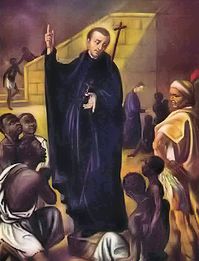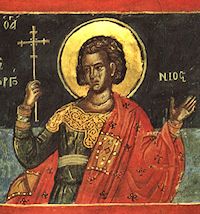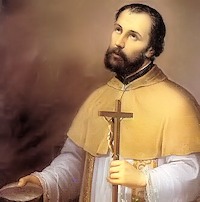Make your gift today!
Help keep Catholics around the world educated and informed.
Already donated? Log in to stop seeing these donation pop-ups.
Ordinary Time: September 9th
Optional Memorial of St. Peter Claver, priest
Other Commemorations: St. Gorgonius, Martyr (RM)
» Enjoy our Liturgical Seasons series of e-books!
Peter Claver was born of a distinguished family in Catalonia, Spain. He became a Jesuit in 1604, and left for Columbia in 1610, dedicating himself to the service of black slaves. For thirty-three years he ministered to slaves, caring for the sick and dying, and instructing the slaves through catechists. Through his efforts three hundred thousand souls entered the Church. He is the Patron of the Negro Missions.
According to the 1962 Missal of Bl. John XXIII the Extraordinary Form of the Roman Rite, today is the feast of St. Gorgonius. Two martyrs named Gorgonius suffered during Diocletian's persecution. One, a Roman, is buried on the Via Labicana; the other, a high court functionary at Nicomedia in Asia Minor, was one of Diocletian's first victims. Later the two were confused and the name Gorgonius occurs only once in the Roman Martyrology.
St. Peter Claver
Peter was born of a distinguished family in Catalonia, Spain in 1581. He joined the Society of Jesus (Jesuits), and after his novitiate in Taragona was sent to the college of Montesione, at Palma in Majorca. There he met Brother Alphonse Rodriguez (also a saint), the humble porter of the convent. Alphonse set Peter's soul on fire to save the souls of the African slaves — thousands being lost because there was no one to minister to them. His superiors finally sent Peter to New Granada in April of 1610. He was never to return to his native Spain.
By 1615 Peter finished his studies and was ordained a priest in Cartagena. When he made his final vows, he added a personal one: Peter, slave of the slaves for ever. Here in this busy seaport city, in a hot, humid, tropical climate, Father Claver spent most of his priestly life. Cartegena was the principal slave market for the New World. Thousands of blacks were brought there, herded into warehouses and auctioned to the highest bidder. Captured in Africa, these slaves were chained in groups of six and crammed into the lower holds of ships designed to hold 100-200, but holding 600-800 humans. Their treatment was so inhumane that 1/3 of the slaves died in the sea journey.
 It was to these people that Peter would minister. He would meet each slave ship as it arrived. Peter would go to the warehouses and bring them food, water, medicine and clothing, for, as he said "We must speak to them with our hands, before we try to speak to them with our lips". But most of all, he brought them God. While nursing them back to health, he would teach them of Christ, explain to them that they were loved by God more than they were abused by man, and that evil outraged God. He offered their only consolation: hope in the promises of God. Nearly three hundred thousand of them received baptism at his hands.
It was to these people that Peter would minister. He would meet each slave ship as it arrived. Peter would go to the warehouses and bring them food, water, medicine and clothing, for, as he said "We must speak to them with our hands, before we try to speak to them with our lips". But most of all, he brought them God. While nursing them back to health, he would teach them of Christ, explain to them that they were loved by God more than they were abused by man, and that evil outraged God. He offered their only consolation: hope in the promises of God. Nearly three hundred thousand of them received baptism at his hands.
After twenty-seven years of devotion to the black slaves, St. Peter Claver died at Cartagena on September 8, 1654. Leo XIII canonized him on January 15, 1888, proclaiming him special patron and protector of the negroes. St. Alphonsus Rodriguez, porter of the college, who inspired Peter to become a missionary for the slaves was canonized at the same time.
Patronage: against slavery; foreign missions; black people; race relations; Colombia; diocese of Shreveport, Louisiana; diocese of Lake Charles, Louisiana.
Symbols and Representation: ship; cockle shell used for baptizing; usually pictured baptizing a black slave.
Highlights and Things to Do:
- Learn the corporal and spiritual works of mercy.
- Learn more about St. Peter Claver:
- According to Saints in Rome, St. Peter Claver's relics are located in Iglesia de San Pedro Claver (Church of Saint Peter Claver) in Cartagena, Colombia.
- Find out more about St. Alphonsus Rodriguez.
- Study modern missionary activities and perhaps ways to become a missionary in small ways; read what Pope John Paul II says about Missionary Activity and Consecrated Life.
- Take a look at African American history, injustice of the slave trade, and African American Catholics today, etc.
St. Gorgonius
 Martyr, suffered in 304 at Nicomedia during the persecution of Diocletian. Gorgonius held a high position in the household of the emperor, and had often been entrusted with matters of the greatest importance. At the breaking out of the persecution he was consequently among the first to be charged, and, remaining constant in the profession of the Faith, was with his companions, Dorotheus, Peter and several others, subjected to the most frightful torments and finally strangled. Diocletian, determined that their bodies should not receive the extraordinary honours which the early Christians were wont to pay the relics of the martyrs (honours so great as to occasion the charge of idolatry), ordered them to be thrown into the sea. The Christians nevertheless obtained possession of them, and later the body of Gorgonius was carried to Rome, whence in the eighth century it was translated by Saint Chrodegang, Bishop of Metz, and enshrined in the monastery of Gorze. Many French churches obtained portions of the saint’s body from Gorze, but in the general pillage of the French Revolution, most of these relics were lost. Our chief sources of information regarding these martyrs are Lactantius and Eusebius. Their feast is kept on 9 September.
Martyr, suffered in 304 at Nicomedia during the persecution of Diocletian. Gorgonius held a high position in the household of the emperor, and had often been entrusted with matters of the greatest importance. At the breaking out of the persecution he was consequently among the first to be charged, and, remaining constant in the profession of the Faith, was with his companions, Dorotheus, Peter and several others, subjected to the most frightful torments and finally strangled. Diocletian, determined that their bodies should not receive the extraordinary honours which the early Christians were wont to pay the relics of the martyrs (honours so great as to occasion the charge of idolatry), ordered them to be thrown into the sea. The Christians nevertheless obtained possession of them, and later the body of Gorgonius was carried to Rome, whence in the eighth century it was translated by Saint Chrodegang, Bishop of Metz, and enshrined in the monastery of Gorze. Many French churches obtained portions of the saint’s body from Gorze, but in the general pillage of the French Revolution, most of these relics were lost. Our chief sources of information regarding these martyrs are Lactantius and Eusebius. Their feast is kept on 9 September.
—Excerpted from The Catholic Encyclopedia
Highlights and Things to Do:
- Learn more about St. Gorgonius:
- The Minden Cathedral in the city of Minden, North Rhine-Westphalia, Germany is dedicated to Saints Gorgonius and Peter.
- From Wikipedia, Rancho San Gorgonio was a ranch in Southern California that was established in 1824 by Spanish missionaries, who named the ranch in honor of Saint Gorgonius. The ranch was one of the principal rancherias, and the most distant, of the San Gabriel Mission, near what is now Los Angeles, California. It occupied most of today's San Gorgonio Pass area. The name of the ranch was applied to a number of local landmarks, and their names in turn have been applied to various establishments, organizations, and more. These include:
- San Gorgonio Pass, the site of the ranch
- San Gorgonio Mountain, an 11,500 foot peak north of the pass
- San Gorgonio River, a seasonal river / wash that runs through the pass.






